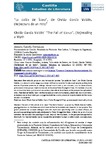La caída de Ícaro, de Olvido García Valdés. (Re)lectura de un mito

Use este enlace para citar
http://hdl.handle.net/2183/27809
A non ser que se indique outra cousa, a licenza do ítem descríbese como Atribución-NoComercial 4.0 Internacional
Coleccións
- Investigación (FFIL) [885]
Metadatos
Mostrar o rexistro completo do ítemTítulo
La caída de Ícaro, de Olvido García Valdés. (Re)lectura de un mitoTítulo(s) alternativo(s)
Olvido García Valdés’ "The Fall of Icarus”. (Re)reading a MythAutor(es)
Data
2021Cita bibliográfica
García-González, Ariana, “«La caída de Ícaro», de Olvido García Valdés. (Re)lectura de un mito”, Castilla. Estudios de Literatura 12 (2021): 457-483, https://doi.org/10.24197/cel.12.2021.457-483.
Resumo
[Resumen] Este artículo propone una lectura del poema “La caída de Ícaro”, de Olvido García Valdés, con atención a los rasgos que mejor definen su carácter fundacional para la poética de la autora. El poema presenta un diálogo inusual con el mito y, en concreto, con La chute d’Icare, pintura anónima que por tradición ha sido atribuida a Pieter Bruegel el Viejo. En realidad, el punto de unión entre texto y pintura se encuentra, más allá de la écfrasis, en la perspectiva aplicada al mito. Para García Valdés, Ícaro verifica la caduca condición humana y, desde ese reconocimiento, se tantea una actitud vital que conjuga la desdicha con la presencia imperturbable del hermoso mundo circundante. [Abstract] The aim of the article is to read "The fall of Icarus", a poem by Olvido García Valdés, paying attention to the features which best define its foundational character in her poetics. The poem presents an unusual dialogue with the myth and specifically with La chute d'Icare, an anonymous painting traditionally attributed to Pieter Bruegel the Elder. In fact, the point of union between the text and the painting is found, beyond the ekphrasis, in the perspective applied to the myth. For García Valdés, Icarus reveals the perishable human condition and, once assumed,attests to a vital attitude that combines misery with the imperturbable presence of beauty throughout the world.
Palabras chave
García Valdés, Olvido
Icaro
Pieter Bruegel el Viejo
Poesía española actual
Pintura
Icarus
Pieter Bruegel the Elder
Contemporary Spanish Poetry
Painting
Icaro
Pieter Bruegel el Viejo
Poesía española actual
Pintura
Icarus
Pieter Bruegel the Elder
Contemporary Spanish Poetry
Painting
Versión do editor
Dereitos
Atribución-NoComercial 4.0 Internacional
ISSN
1989-7383






